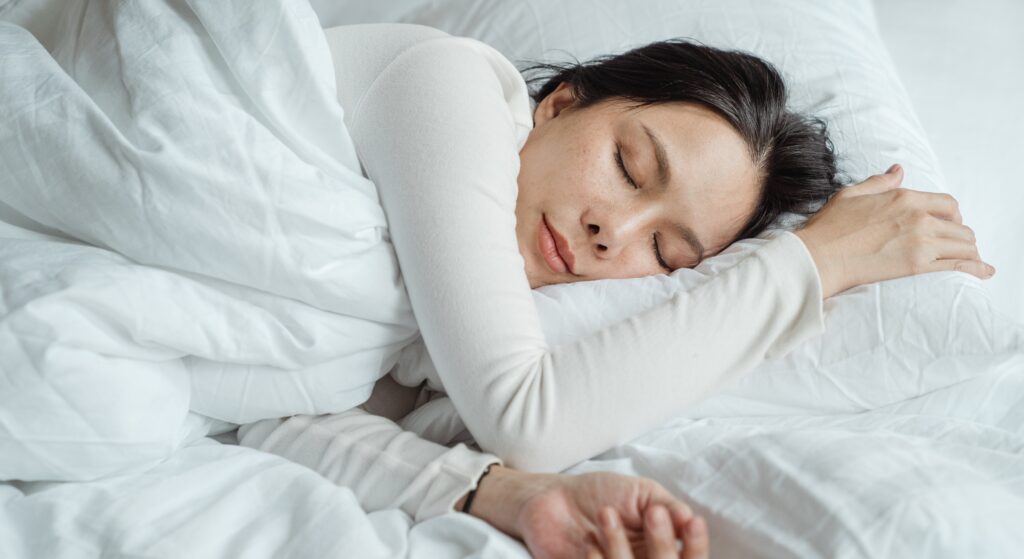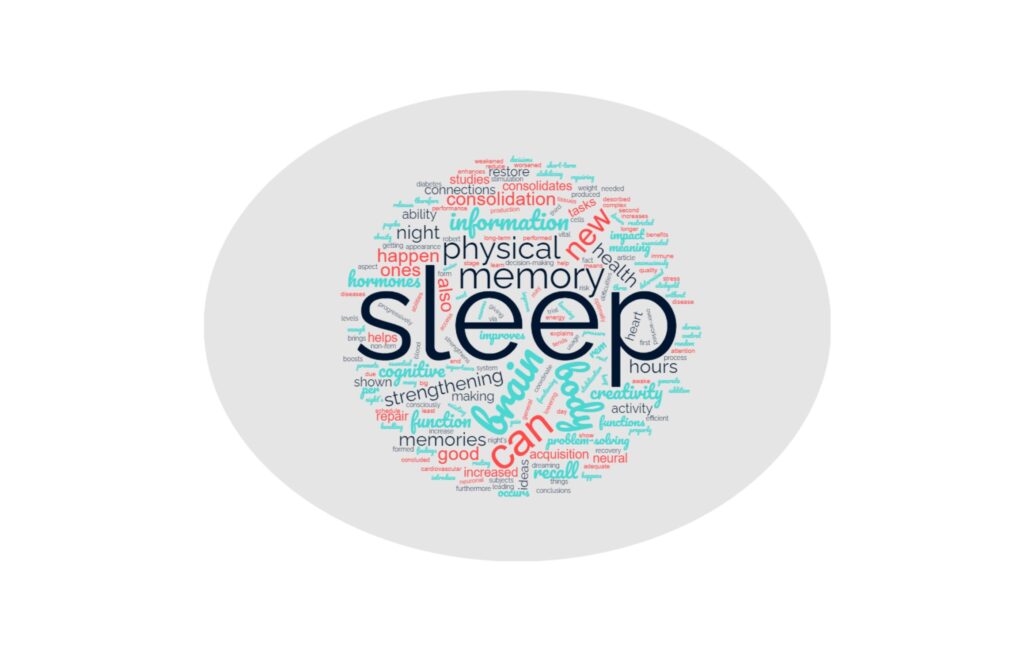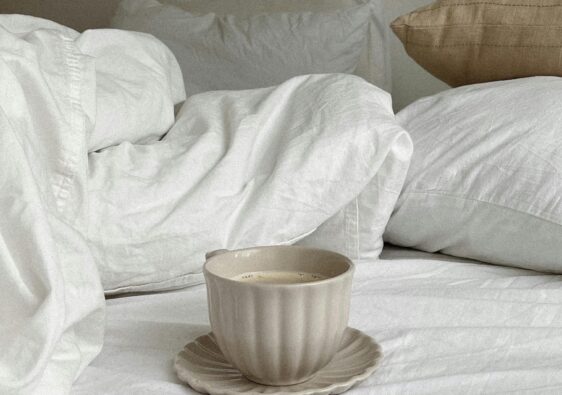“Sleep is the single most effective thing we can do to reset our brain and body health each day.” – Matthew Walker, Neuroscientist and author of “Why We Sleep”
Sleeping is, as we all know, a basic, but crucial need of the human being, without which we can’t function right. Probably most of us experienced difficulties in having a rewarding day after not getting enough sleep the night before. Furthermore, it has also been scientifically proven that a good night sleep can improve productivity, focus and creativity. In the following, I will explain the benefits of sleep and I will also provide you with a list of techniques in order to fall asleep easier.

“Sleep is essential for optimal productivity and performance. It helps us to be more efficient, make better decisions, and stay focused throughout the day.”
James Maas, Sleep Researcher and author of “Power Sleep”
How exactly does sleep increase our productivity?
I’m sure most of us heard at least once in our lifetime, especially when we were kids, that we should go to sleep so that the next morning we won’t be tired or grumpy. It is common sense that sleep is beneficial to our mind and body, but the reason why, was never explained, therefore I made some research regarding this topic and found some very interesting pieces of information.
Enhances memory consolidation
During sleep, the brain consolidates and strengthens memories, making it easier to recall information and learn new things the next day. Dr. Robert Stickgold explains in the article “Sleep, Learning, and Memory” that memory is described via three functions: acquisition, consolidation and recall, which means that first we introduce the new information into the brain, second the process of stabilizing the memory is performed and third we gain the ability to access the information consciously or unconsciously. Acquisition and recall happen when we are awake, but the memory consolidation occurs during sleep through the strengthening of the neural connections that form our memories. Therefore, it can be concluded that the most vital function of memory, the stabilization, can only happen if we have a good night sleep.
Improves cognitive function
Sleep also helps to restore cognitive functions, such as attention, decision-making, and problem-solving. Without adequate sleep, over-worked neurons can no longer function to coordinate information properly and our brain tends to have difficulties in handling complex tasks and making efficient decisions. The effect of sleep deprivation on cognitive processing can be better pictured through the seminal study “The cumulative cost of additional wakefulness” where young adults were restricted to 4, 6, or 8 hours of sleep per night for 14 days. Throughout the day they were given different types of tests from simple additions and subtractions to working memory test. At the end of the trial the findings have shown that the performance of the subjects restricted to 4 and 6 hours of sleep per night worsened progressively on all cognitive tasks, further strengthening the importance of having at least 8 hours of sleep per night.
Boosts creativity
Many studies show that a good night’s sleep can improve the quality of our ideas and increase our ability to generate new ones. How does this happen? Through REM, the stage of sleep when dreaming occurs, which is associated with increased creativity and problem-solving abilities. Maryann C. Deak and Robert Stickgold explain in their study “Sleep and Cognition” that sleep is divided in two stages: the first one is the rapid eye movement sleep (REM) and the second is the non-rapid eye movement sleep (non-REM), which alternate throughout the night in a roughly 90-minute cycle. In the non-REM sleep, the brain consolidates the short-term memories into long-term ones through neural stimulation and draws general conclusions, while in the REM sleep the brain activity is more random, meaning that new neuronal connections can be formed and existing ones weakened , leading to increased creativity and new ideas.
Improves physical health
Sleep is essential for physical health as it helps to repair and restore the body through the production of hormones needed to keep your immune system functioning optimally. Getting enough sleep can reduce the risk of chronic diseases such as diabetes, obesity and heart disease. Furthermore, studies have shown that a good night’s sleep increases physical recovery of your body and brain, repairing and strengthening tissues, giving your heart a rest, and lowering your blood pressure and stress levels to promote cardiovascular health.
The physical aspect of our body is also determined by our sleep schedule, meaning that the hormones produced during the resting hours may impact our body weight. This happens due to the fact that when we sleep our body releases hormones which help repair cells and control the energy usage of our body. So, in addition to the benefits that sleep brings to our brain activity, it also has a big impact on our physical appearance.

5 ways to fall asleep easier
Nowadays, with the increasing amount of stress, anxiety and pressure that young adults experience, it has become more and more difficult to fall asleep at a reasonable hour and have a restful sleep throughout the night. I personally had difficulties falling asleep and properly resting my brain and my body, which further caused a downfall of my well-being in terms of lacked energy, happiness and even confidence.
When I rested my head on the pillow, I experienced the so called “monkey mind”, a phenomenon where I couldn’t focus on the present moment and one thought led to another: I couldn’t fall asleep because I was stressed and I was stressed because I couldn’t fall asleep and so on. In order to overcome this problem I have tried a few methods to help me fall asleep easier and have a more relaxing sleep. I created a list with a few practices that helped me overcome this.
1. Air the room 10 minutes before you go to sleep
Most of the times when I experienced anxiety because I couldn’t fall asleep I started feeling very warm, the bed linen were burning hot and the air became unbreathable. Then, I did a little research to find out how to get rid of this sensation and found that it was actually scientifically proven that having fresh air and oxygen in the room you sleep in, is beneficial for the body and mind.
A study published in the International Journal of Environmental Research and Public Health in 2018 titled “The Effects of Indoor Air Quality on Sleep” examined the impact of indoor air quality on sleep. After analysing studies from around the world they concluded that fresh air can not only contribute to better sleep quality but to an overall health improvement. Moreover fresh air and oxygen can also contribute to increased energy levels and a sense of vitality. Besides the numerous studies that have shown the benefits of outdoor activities and spending time in nature, we all have experienced these mood and energy improvements whilst being outside and enjoying the nature. A similar effect has the fresh air intake during sleep, it helps individuals feel more refreshed and energized upon waking up.
Consequently, I started religiously airing my room at least 10 minutes before tucking myself into bed and let me tell you, it really made a difference.
2. Darken the room
When talking about darkening the room before going to sleep there is a matter of preferences: you can either close the curtains in order to have a pitch black room, use a sleeping mask to block any kind of light or simply just turn off any source of light in the room. I personally prefer keeping the curtains open in order for the sunlight to wake me up in the morning (I suggest that if you have an early morning, it is a more natural and pleasant way to wake up) and also, I don’t use any kind of eye cover ups because I don’t feel comfortable wearing them. The one thing I do is, I eliminate any lights in the room or at least the blue ones, that means TV or phone/tablet light.
The blue light coming from electronic devices keeps the mind alert. In the article “How Blue Light Affects Sleep” it has been explained that this kind of light suppresses the body’s release of melatonin (a hormone which induces sleepiness) and tricks our brain into thinking that it is still daytime, disrupting our circadian rhythm. If I do feel like watching something on Netflix or scroll a bit on TikTok before going to sleep, I always use the night mode or the night time option of these devices.
3. Listen to calming music or white noises
If you ask yourself how many times did you fall asleep while watching a movie, listening to music or even to someone speaking in the background, I am sure that the answer will be at least a few times. Why is that? Well, a study showed that people fall asleep 38% faster when hearing white noises in the background. If there is a loud noise in your proximity which you cannot eliminate, white noises can help to tame down the impact it has on your mind and prepare the brain for turning off. This is also a solution for the monkey mind and the overthinkers, because it quiets down the thoughts and brings the focus on the noise. I tried listening to music and also videos with white noises, both of them worked wonders on me, I fell asleep like a baby.
A very important thing to mention is that, when choosing a video I pay attention to the visuals (they should be as dark as possible) and to the format (it shouldn’t contain any voices). Of course, these are just my preferences, but if you would like to check and try some of them out, these are two of my favourite YouTube videos that I have been listening to in order to fall asleep easier:
4. Use breathing techniques to calm your mind
Since I was a kid my mother always told me that if I ever find myself in a difficult circumstance and I am nervous, I should step back for a moment and take 3 deep breaths to calm my mind and my heartbeats; a practice that really helped me in most of the situations. The same applies for the difficulties falling asleep, when I feel that my thoughts start running wild, I stop myself for a second and focus on my breathing.
There are different types of breathing techniques, but the one I use most often is the 4 in 6 out method, simple as it sounds, I inhale for 4 seconds, exhale the next 6 seconds and repeat it for as long as I need in order to calm down. The fresh oxygen in the lungs, the constant breathing in through the nose, out through the mouth and the focus on the repetitive counting of the breaths calms the mind and induces sleep. If you are interested in finding more breathing exercises and their precise “how to”, check out this article.
5. Meditation
Mental health is a very important aspect in our lives, even more if the main goal is to become the best version of ourselves and I am thrilled to see that so many people are working on themselves, trying to include meditation and gratitude in their daily activities. Meditation can be anything that makes you focus on the present moment and stabilizes your mental state, it can be guided, it can be on your own by simply breathing or focusing on an object or activity.
Meditating on your own
In order to help myself relax and fall asleep easier, I have tried both guided meditation, with the help of an app with recorded meditations and on my own by simply giving my gratitude for everything good that happened in my day and focusing on my breathing. Few examples are: breathing techniques, 2 minutes of simple gratitude, praying or even starring at a point on the wall imagining a white canvas in your mind. As long as it makes you feel relaxed and comfortable, anything that you can think of counts as meditation. You have to try different approaches and see what works best for you, which techniques helps you achieve that mental state for falling asleep.
Guided meditation
When talking about guided meditation, there are plenty of options: you can find YouTube videos, Spotify podcasts and even apps that provide recorded guided meditations. There is also a series on Netflix, which I have been watching, produced by Headspace (they have a really cool app with lots of meditations, stories and music, if you want to try it) called “Guide to Meditation” containing 8 episodes around 20 minutes long where a soft voice offers techniques and guidance to start your journey with meditation. Whichever alternative you choose, make sure it appeals to you and your energy and creates a comfortable state of mind to help you fall sleep.
Conclusions
Sleep is a vital component of our lives and especially for our productivity, due to the fact that, during sleep, the brain consolidates and strengthens memories, making it easier to recall information and learn new things the next day. Sleep also helps to restore cognitive functions, such as attention, decision-making, and problem-solving. The boost of creativity and the ability to generate or improve ideas is linked to a good resting. The physical aspect of our body is also determined by our sleep schedule, our body weight and our immune system depend on the production of hormones during the resting hours.
In order to enjoy these benefits of a resting sleep I have listed a few techniques to fall asleep easier. Airing and darkening the room helps our brain feel that it is time to turn off, relax and soak up the fresh oxygen. Relaxing music and white noises tame down the thoughts and create a comfortable environment for us to fall asleep. And lastly, breathing techniques and practicing meditation are excellent ways to bring yourself back in the moment, calm your heartbeats and induce a state of sleepiness.
There are many other techniques which can be used, but these are the 5 methods that I have used most often and helped me fall asleep easier and have a more resting sleep. If you try them out, leave a comment and tell me how they worked out for you and if you find any other interesting methods, please do share them with us.
Hugs and Kisses.
